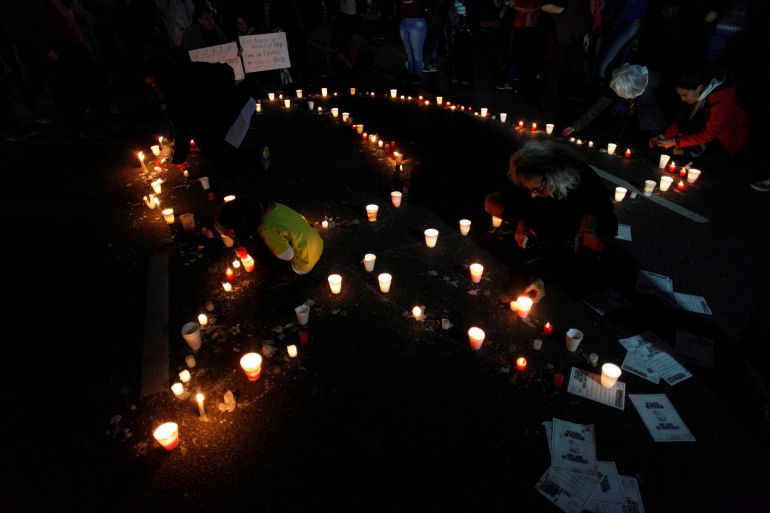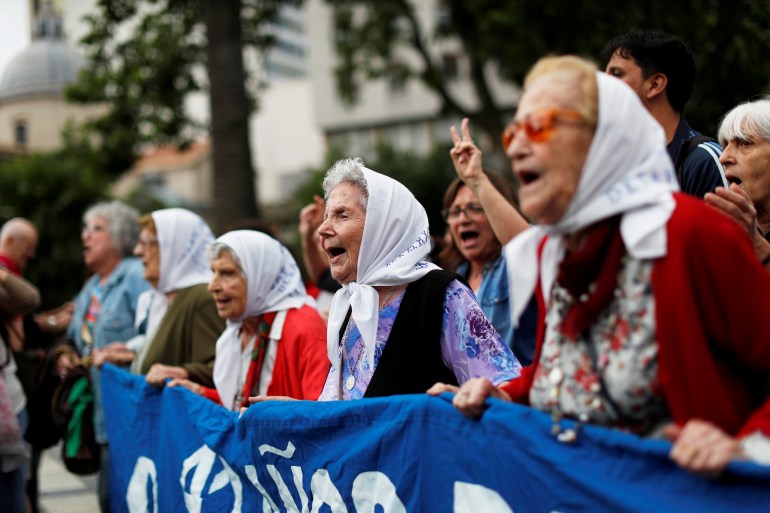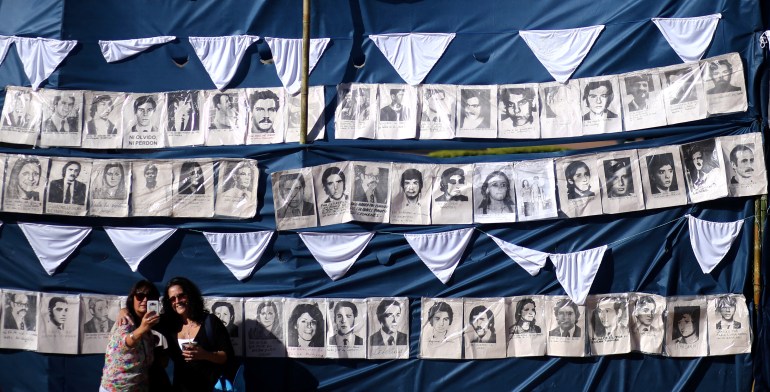In Argentina, COVID jabs propel search for ‘stolen grandchildren’
Advocates use vaccination campaign as a way to keep search for grandchildren ‘stolen’ during 1976-1983 dictatorship alive.

Buenos Aires, Argentina – As a child growing up in the city of La Plata in the 1980s, Leonardo Fossati would look in the mirror and think that reality was on the other side.
It was a game the little boy played. He felt like he was living in a movie and that there was something about his own life he could not see. Years later, he would come to understand the game as much more: a manifestation among others that there was more to his story.
Keep reading
list of 3 itemsArgentina: DNA reunites thousands after ‘Dirty War’
US hands Argentina declassified documents on ‘Dirty War’
In fact, his story was entirely different. The people who raised him were not his biological parents and a DNA test in 2005 determined that he was one of Argentina’s stolen grandchildren: babies who were born in captivity during the military dictatorship that terrorised the country from 1976 to 1983 and who were given to other families to raise.
His parents, Ines Beatriz Ortega and Rubén Leonardo Fossati, are among an estimated 30,000 people who were disappeared by security forces during that period and whose remains have never been recovered.
“No matter how hard it is, the truth always creates a solid foundation from which to continue with your life,” he said.
That Fossati and others like him know the truth is thanks to the Abuelas de Plaza de Mayo, (Grandmothers of the Plaza de Mayo), an organisation of women who defied a shroud of silence over Argentina during the dictatorship and held weekly marches demanding to know what happened to their disappeared children and grandchildren.
So far, the identities of 130 people have been restored through DNA testing. But the search continues for about 300 more – and a new campaign is trying to leverage COVID-19 vaccinations to help in that task.
‘Help us find you’
With 40 year olds – the age group that corresponds to the grandchildren – now getting vaccinated in Argentina, Abuelas is asking people to post photos of their jabs on social media with the hashtag #UnaDosisDeIdentidad (One Dose of Identity).
The posts are accompanied by text that urges anyone born between 1975 and 1980 and who has doubts about their identity to reach out to the organisation, which is constantly coming up with new ways of keeping the search alive.
“We saw it as an opportunity because in a short period of time, the grandchildren we’re looking for will be paying attention because they are getting vaccinated,” said Belen Altamiranda Taranto, the 88th identified grandchild, who now works with Abuelas de Plaza de Mayo in the city of Cordoba.
This year, the government also launched a campaign targeting Argentines living abroad under the banner “Argentina Te Busca” – Argentina is Looking For You. Several people have discovered their true identities after they moved overseas as adults to Holland, the United States and Spain. Others were found at a younger age in Chile and Uruguay.
“Help us find you,” Felipe Sola, the foreign affairs minister, said in a video message that directed people to contact a consulate of Argentina with questions.

Dictatorship atrocities
That so many grandchildren remain unaccounted for speaks to the pact of silence that remains among those who committed atrocities.
Under the pretence of eradicating leftist rebels, security forces unleashed a broad campaign of state terrorism that eliminated political dissidents, students, activists, union campaigners, journalists and many more.
People were snatched off the streets, tortured, murdered, hurled off planes into the river below or buried in unmarked graves during the dictatorship period. Young women who were pregnant at the time of their disappearance gave birth in clandestine detention centres and their babies were then placed in the homes of families that supported the military, or with others who did not ask questions about the children’s origins.
These were not isolated incidents, but a systematic plan of appropriation of children that constituted a crime against humanity, an Argentinian court found in 2012. More than 1,000 people have been sentenced for their roles in that dark period.
Destroying generations
Initiatives like the Una Dosis campaign offer a glimmer of hope for people like Anna Carriquiriborde, 41, whose aunt Gabriela Carriquiriborde disappeared in 1976 in La Plata. Her family is looking for her baby, born in captivity in December of that year.
Witnesses say the baby was a boy, said Carriquiriborde, although a woman who believes she is Gabriela’s daughter is currently waiting for results from a DNA test. Two other people have also suspected they were Gabriela’s child, but tested negative.
“Obviously, I’m very anxious to meet my cousin,” said Carriquiriborde, who lives in La Plata but was born and raised in Sweden, which provided political asylum to her parents who fled the dictatorship. “We talk about it all the time in the family. It would bring us a lot of happiness, to find closure in this story.”
The discovery would be especially important for her father, she said; Like his disappeared sister, he was a member of the Juventud Universitaria Peronista, the university wing of the Peronist political party, and feels guilt over what happened to her.
“I think it’s all very nefarious, and to have held them captive to remove their children,” said Carriquiriborde. “They took away our present, which was my aunt, and also our future. The military dictatorship destroyed many generations.”

It has taken years to generate a collective awareness of what occurred, and if there is one thing that is working against the search, it is time.
“There are very few grandmothers left,” said Taranto. “They are very old and it’s a feeling of great sadness and impotence to see them leave us, without having been able to find their grandchildren or the bodies of their children.”
‘Sense of freedom’
Taranto and Fossati, both 44, described gaining a sense of empowerment once they were able to find out who they really were.
Taranto met both sets of grandparents before they passed away. “It’s not a cliche, but you feel a sense of freedom – I’m free to do what I want to do with my story,” said Taranto, whose disappeared parents Cristian Adrian and Natalia Vanesa were members of the Workers’ Revolutionary Party.
In the case of Fossati, his mother was part of the Unión Estudiantil Secundaria (Secondary School Students Union) and his father a member of the Juventud Universitaria Peronista.
The couple who raised him did not have ties to the military. One day in 1977 they received a call from a local midwife, who had a baby that she said needed a home. Fossati figured out on his own that he was not their biological child and sought answers once he became a father.
“What happened to me not an adoption, but an appropriation,” he said.
Now he runs a memorial space in La Plata out of a former clandestine detention centre where his parents were held captive. It is also where he was born.
“I’ve come to learn that you don’t only inherit skin colour, eye colour or stature from your genes,” said Fossati, who nearly named his own child Leonardo, the name he assumed years later upon discovering that it was what his mother had named him. “Other things are passed down during a pregnancy.”
Doubts, he added, are also inherited – so he urged anyone who might harbour them to seek out answers. “Time passes quickly, it’s worth it to overcome your fears,” he said. “And it’s your right to know your identity.”
Anyone who has doubts about their identity can contact Abuelas de Plaza de Mayo through their website.